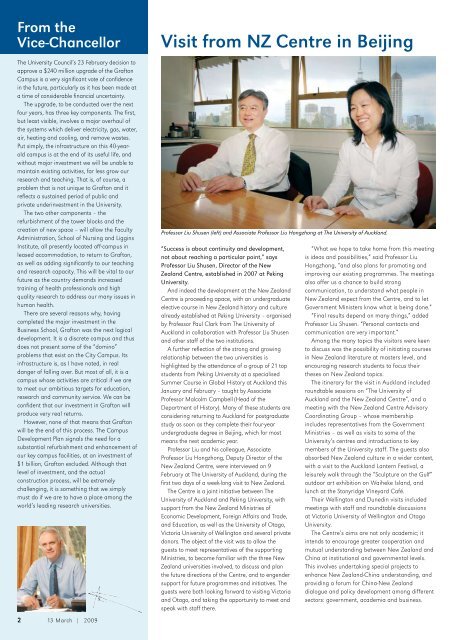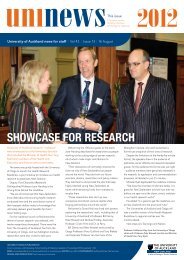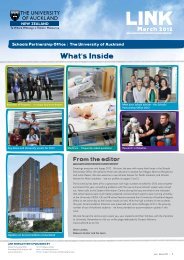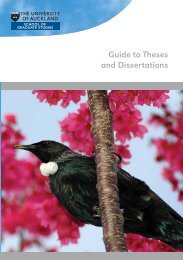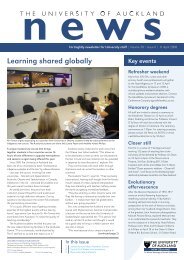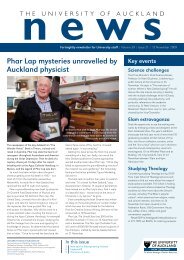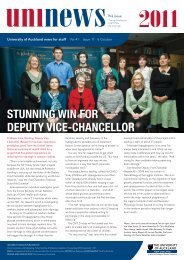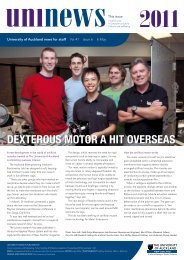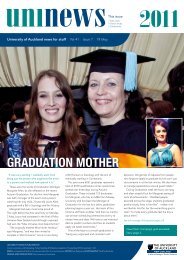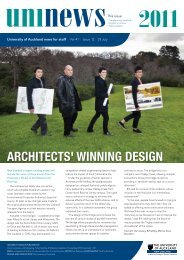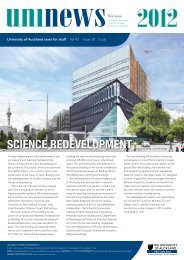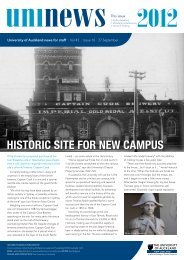Issue 4: 13 March 2009 - The University of Auckland
Issue 4: 13 March 2009 - The University of Auckland
Issue 4: 13 March 2009 - The University of Auckland
You also want an ePaper? Increase the reach of your titles
YUMPU automatically turns print PDFs into web optimized ePapers that Google loves.
From the<br />
Vice-Chancellor<br />
the <strong>University</strong> Council’s 23 February decision to<br />
approve a $240 million upgrade <strong>of</strong> the grafton<br />
Campus is a very significant vote <strong>of</strong> confidence<br />
in the future, particularly as it has been made at<br />
a time <strong>of</strong> considerable financial uncertainty.<br />
the upgrade, to be conducted over the next<br />
four years, has three key components. the first,<br />
but least visible, involves a major overhaul <strong>of</strong><br />
the systems which deliver electricity, gas, water,<br />
air, heating and cooling, and remove wastes.<br />
Put simply, the infrastructure on this 40-yearold<br />
campus is at the end <strong>of</strong> its useful life, and<br />
without major investment we will be unable to<br />
maintain existing activities, far less grow our<br />
research and teaching. that is, <strong>of</strong> course, a<br />
problem that is not unique to grafton and it<br />
reflects a sustained period <strong>of</strong> public and<br />
private underinvestment in the <strong>University</strong>.<br />
the two other components – the<br />
refurbishment <strong>of</strong> the tower blocks and the<br />
creation <strong>of</strong> new space – will allow the Faculty<br />
Administration, school <strong>of</strong> nursing and Liggins<br />
institute, all presently located <strong>of</strong>f-campus in<br />
leased accommodation, to return to grafton,<br />
as well as adding significantly to our teaching<br />
and research capacity. this will be vital to our<br />
future as the country demands increased<br />
training <strong>of</strong> health pr<strong>of</strong>essionals and high<br />
quality research to address our many issues in<br />
human health.<br />
there are several reasons why, having<br />
completed the major investment in the<br />
Business school, grafton was the next logical<br />
development. it is a discrete campus and thus<br />
does not present some <strong>of</strong> the “domino”<br />
problems that exist on the City Campus. its<br />
infrastructure is, as i have noted, in real<br />
danger <strong>of</strong> falling over. But most <strong>of</strong> all, it is a<br />
campus whose activities are critical if we are<br />
to meet our ambitious targets for education,<br />
research and community service. We can be<br />
confident that our investment in grafton will<br />
produce very real returns.<br />
however, none <strong>of</strong> that means that grafton<br />
will be the end <strong>of</strong> this process. the Campus<br />
development Plan signals the need for a<br />
substantial refurbishment and enhancement <strong>of</strong><br />
our key campus facilities, at an investment <strong>of</strong><br />
$1 billion, grafton excluded. Although that<br />
level <strong>of</strong> investment, and the actual<br />
construction process, will be extremely<br />
challenging, it is something that we simply<br />
must do if we are to have a place among the<br />
world’s leading research universities.<br />
2 <strong>13</strong> <strong>March</strong> | <strong>2009</strong><br />
Visit from NZ Centre in Beijing<br />
Pr<strong>of</strong>essor Liu Shusen (left) and Associate Pr<strong>of</strong>essor Liu Hongzhong at <strong>The</strong> <strong>University</strong> <strong>of</strong> <strong>Auckland</strong>.<br />
“Success is about continuity and development,<br />
not about reaching a particular point,” says<br />
pr<strong>of</strong>essor liu Shusen, director <strong>of</strong> the New<br />
Zealand Centre, established in 2007 at peking<br />
<strong>University</strong>.<br />
And indeed the development at the new Zealand<br />
Centre is proceeding apace, with an undergraduate<br />
elective course in new Zealand history and culture<br />
already established at Peking <strong>University</strong> – organised<br />
by Pr<strong>of</strong>essor Paul Clark from the <strong>University</strong> <strong>of</strong><br />
<strong>Auckland</strong> in collaboration with Pr<strong>of</strong>essor Liu shusen<br />
and other staff <strong>of</strong> the two institutions.<br />
A further reflection <strong>of</strong> the strong and growing<br />
relationship between the two universities is<br />
highlighted by the attendance <strong>of</strong> a group <strong>of</strong> 21 top<br />
students from Peking <strong>University</strong> at a specialised<br />
summer Course in global history at <strong>Auckland</strong> this<br />
January and February – taught by Associate<br />
Pr<strong>of</strong>essor Malcolm Campbell (head <strong>of</strong> the<br />
department <strong>of</strong> history). Many <strong>of</strong> these students are<br />
considering returning to <strong>Auckland</strong> for postgraduate<br />
study as soon as they complete their four-year<br />
undergraduate degree in Beijing, which for most<br />
means the next academic year.<br />
Pr<strong>of</strong>essor Liu and his colleague, Associate<br />
Pr<strong>of</strong>essor Liu hongzhong, deputy director <strong>of</strong> the<br />
new Zealand Centre, were interviewed on 9<br />
February at the <strong>University</strong> <strong>of</strong> <strong>Auckland</strong>, during the<br />
first two days <strong>of</strong> a week-long visit to new Zealand.<br />
the Centre is a joint initiative between the<br />
<strong>University</strong> <strong>of</strong> <strong>Auckland</strong> and Peking <strong>University</strong>, with<br />
support from the new Zealand Ministries <strong>of</strong><br />
Economic development, Foreign Affairs and trade,<br />
and Education, as well as the <strong>University</strong> <strong>of</strong> otago,<br />
Victoria <strong>University</strong> <strong>of</strong> Wellington and several private<br />
donors. the object <strong>of</strong> the visit was to allow the<br />
guests to meet representatives <strong>of</strong> the supporting<br />
Ministries, to become familiar with the three new<br />
Zealand universities involved, to discuss and plan<br />
the future directions <strong>of</strong> the Centre, and to engender<br />
support for future programmes and initiatives. the<br />
guests were both looking forward to visiting Victoria<br />
and otago, and taking the opportunity to meet and<br />
speak with staff there.<br />
“What we hope to take home from this meeting<br />
is ideas and possibilities,” said Pr<strong>of</strong>essor Liu<br />
hongzhong, “and also plans for promoting and<br />
improving our existing programmes. the meetings<br />
also <strong>of</strong>fer us a chance to build strong<br />
communication, to understand what people in<br />
new Zealand expect from the Centre, and to let<br />
government Ministers know what is being done.”<br />
“Final results depend on many things,” added<br />
Pr<strong>of</strong>essor Liu shusen. “Personal contacts and<br />
communication are very important.”<br />
Among the many topics the visitors were keen<br />
to discuss was the possibility <strong>of</strong> initiating courses<br />
in new Zealand literature at masters level, and<br />
encouraging research students to focus their<br />
theses on new Zealand topics.<br />
the itinerary for the visit in <strong>Auckland</strong> included<br />
roundtable sessions on “the <strong>University</strong> <strong>of</strong><br />
<strong>Auckland</strong> and the new Zealand Centre”, and a<br />
meeting with the new Zealand Centre Advisory<br />
Coordinating group – whose membership<br />
includes representatives from the government<br />
Ministries – as well as visits to some <strong>of</strong> the<br />
<strong>University</strong>’s centres and introductions to key<br />
members <strong>of</strong> the <strong>University</strong> staff. the guests also<br />
absorbed new Zealand culture in a wider context,<br />
with a visit to the <strong>Auckland</strong> Lantern Festival, a<br />
leisurely walk through the “sculpture on the gulf”<br />
outdoor art exhibition on Waiheke island, and<br />
lunch at the stonyridge Vineyard Café.<br />
their Wellington and dunedin visits included<br />
meetings with staff and roundtable discussions<br />
at Victoria <strong>University</strong> <strong>of</strong> Wellington and otago<br />
<strong>University</strong>.<br />
the Centre’s aims are not only academic; it<br />
intends to encourage greater cooperation and<br />
mutual understanding between new Zealand and<br />
China at institutional and governmental levels.<br />
this involves undertaking special projects to<br />
enhance new Zealand-China understanding, and<br />
providing a forum for China-new Zealand<br />
dialogue and policy development among different<br />
sectors: government, academia and business.


